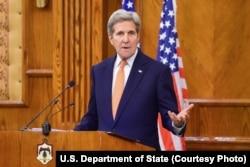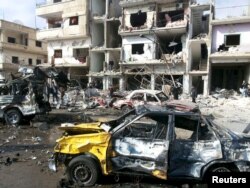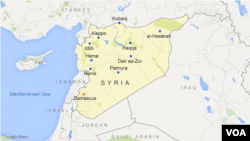The many parties involved in Syria's five-year war are weighing whether to sign on to a cease-fire proposed by the United States and Russia that would begin Saturday.
The cessation of hostilities would not apply to terrorist groups such as Islamic State and al-Qaida affiliate Jabhat al-Nusra. Any other groups have until Friday to confirm their participation.
A halt in fighting could pave the way for an expansion of humanitarian aid to Syria's many besieged cities and set the stage for a resumption of talks on a political transition.
In a joint statement Monday, the U.S. and Russia said that under the plan parties involved in the conflict would limit any use of force to situations such as responding in self defense. The parties would also agree to provide unhindered access to humanitarian groups delivering aid to besieged areas.
The U.S. and Russia are co-chairs of a cease-fire task force that is part of the 17-nation International Syria Support Group. The group met in Munich earlier this month and had hoped to implement an initial cease-fire plan by last Friday.
Some of the issues linked to the cessation still appear to be unresolved.
State Department spokesman Mark Toner said that over the next few days, the task force will work out standard operating procedures.
He also said the group may rely in part on non-government organizations and journalists in Syria for reports on possible cease-fire violations.
"No one is denying that this is going to be a challenging environment to monitor," Toner said.
Assurances needed
The group is also seeking assurances from the Syrian government, the opposition and other parties involved in the conflict.
"Over the coming days, we will be working to secure commitments from key parties that they will abide by the terms of this cessation," said Secretary of State John Kerry.
In an interview with Al Arabiya, Syrian opposition leader Khaled Khoja expressed concern that the Syrian government could use the presence of al-Nusra terrorists as a pretext to continue hitting rebel targets in areas near the terrorist group.
Earlier, the White House said President Barack Obama and Russian Leader Vladimir Putin spoke by phone Monday to discuss the plan.
The White House said Obama emphasized that the priority was to ensure "positive responses" by the Syrian regime and the armed opposition.
Under the plan, the parties involved in the conflict are to confirm their commitment to the cease-fire by Feb. 26.
"Russian and American military will jointly define the territories on the map where such groups are active," Putin said.
Word of the potential truce comes a day after Islamic State militants claimed responsibility for a series of attacks in Damascus and Homs left over 100 people dead.
Toner condemned the attacks and said it would take a "united and global effort to destroy this terrorist organization."
Russia's Foreign Ministry said in a statement the terror attacks need an adequate reaction from the international community.
UN urges all parties to comply
A U.N. spokesman said Secretary-General Ban Ki-Moon welcomed the agreement announced by Russia and the U.S. and “strongly urges” all parties to abide by terms of the agreement.
Earlier this month, U.N.-facilitated talks between the Syrian government and opposition broke off, partly due to opposition concerns about the Russian-backed Syrian government’s continued bombings around Aleppo.
U.N. envoy for Syria Staffan de Mistura initially planned to resume talks by Feb. 25 but, last week, the U.N. announced the talks would be further delayed.
Syrian President Bashar al-Assad has said his government is ready for a cease-fire, but not if "terrorists" use it to bolster their positions. He has regularly referred to any opposition fighters as terrorists throughout the conflict that began in March 2011.
Russian airstrikes
Russia's airstrikes have been blamed for increasing the war's toll on Syrian civilians, prompting more of them to leave their homes as refugees and try to flee across the border into Turkey.
UNICEF welcomed word of a cease-fire plan Monday, which could allow relief organizations to expand deliveries of aid.
"If implemented, a cessation of hostilities represents an opportunity to begin the work of repairing a country that has suffered far too much for far too long," said the agency's executive director, Anthony Lake.
VOA White House correspondent Mary Alice Salinas and Chris Hannas in Washington contributed to this report.







